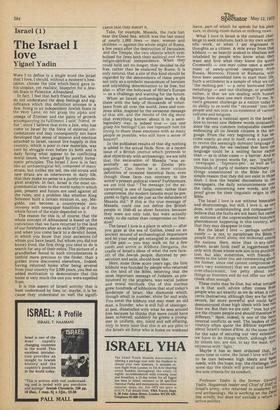Israel (1)
The Israel I love
Yigael Yadin
Were I to define in a single word the Israel that I love, I should, without a moment's hesitation, choose the title which Herzl gave to his utopian, yet realistic, blueprint for a Jewish State in Palestine: Altneuland.
In fact, I feel that both friend and foe, who do not understand the deep feelings and sig nificance which this definition arouses in a Jew, living in an independent Jewish State in the Holy Land, do not grasp the alpha and omega of Zionism and the pains of growth accompanying its fulfilment. I said' friend or foe ', since I believe that even a Jew, who has come to Israel by the force of external cir cumstances and may consequently not have developed that sense of mission and emotion attached to Israel, cannot live happily in this country, which is poor in raw materials, was torn by struggle even before its birth and is
daily facing what appear to be conflicting moral issues, when gauged by purely humanistic principles. The Israel I love is in fact like an archaeological tell, composed of many . strata; but unlike the telt, the old strata and new strata are so interwoven in daily life, that they make no sense in a purely chronological analysis. In fact, Israel is the most ungrammatical state in the world today in which past, present and future are used against all the rules; and a problem like whether King Solomon built a certain stratum in, say, Megiddo, can become a countrywide controyersy with newspaper headlines as if the whole future of the state depended on it.
The reason for this is, of course, that the whole concept of Altneuland is based on the conviction that we have returned to the land of our forefathers after an exile of 2,000 years; and when you come back to a derelict home, in which you know that your ancestors (of whom you have heard, but whom you did not know) lived, the first thing you tend to do is search for any of their relics. The picture of a grandfather found in such circumstances is tenfold more precious to the finder, than a golden trove discovered elsewhere,. Indeed, having returned home after being severed from your country for 2,000 years, you feel an added motivation to demonstrate that this home is very much the one you were expelled from.
It is this aspect of Israeli activity that is least understood by foes, or, maybe, it is because they understand so well the signifi
cance tnat they distort it.
Take, for example, Masada, the rock fort near the Dead Sea, which was the last stand of nearly 1,000 Jews — men, women and children — against the whole might of Rome, a few years after the destruction of Jerusalem and the Temple, the two objects which symbolised for Jews both their political and thpir religio-spiritual independence. When they could hold out no longer, they decided to die free, rather than be enslaved by Rome. It is only natural, that a site of this kind should be regarded by the descendants of these people not only as a symbolic mausoleum of heroism and unyielding determination to be free, but also — after the holocaust of Hitler's Europe — as a challenge and warning for the future.
When an Israeli archaeologist leads a dig there with the help of thousands of volunteers from all over the world, Jews and nonJews alike, inspired by the awesome message of that site, and the results of the dig show that everything known about it in a semilegendary way, is indeed true — can one grasp his feelings? Can one reproach him for trying to share these emotions with as many people as possible, who still have a sense of history?
In the published results of that dig nothing is added to the actual finds. Now, in a recent issue of a British journal which pretends to deal objectively with archaeology, we are told that the excavation of Masada "was essentially an exercise in Zionist propaganda." Can there be a more vicious definition of revealed historical facts, even though these facts run contrary to the writer's present political views? Furthermore, we are told that "The message [of the excavations] is one of fanaticism: rather than compromise, the modern Israelis must be prepared to fight and die just as the defenders of Masada did." If this is the true message of Masada, could one not define the British people in 1940-45 as sheer fanatics, because they were not only told, but were actually ready, to die rather than compromise on freedom?
The Israel I love is a place in which — after you gaze at the sea of Galilee, tread on an ancient mound of archaeological importance and let your mind get entangled in memories of the past — you may walk on for a few yards and arrive at Kibbutz Dengania, the cradle of Israel's ideas of what the new facelift of the Jewish people, distorted by persecution and exile, should look like.
Here, some three score years ago, the first kibbutz was founded by people who returned to the land of the Bible, believing that the most important message of Judaism, as pronounced by the prophets, was social justice and moral rectitude. Out of this nucleus grew hundreds of kibbutzim that stud today's landscape of Israel, like diamonds which, though small in number, shine far and wide, You enter the kibbutz and may meet an old man, a founder, who is still full of ideological zest, dissatisfied with what he sees around him because he thinks that more could have been achieved; suddenly he greets a youngster in uniform, shy, timid and self-effacing, only to learn later that this is an ace pilot in the Israeli air force who is home on weekend


































 Previous page
Previous page